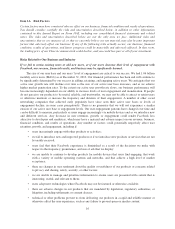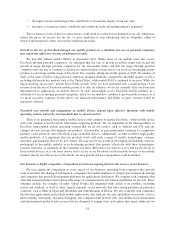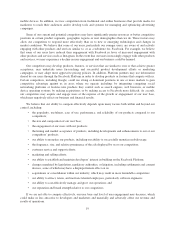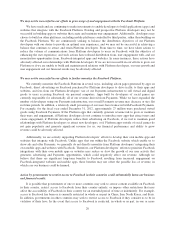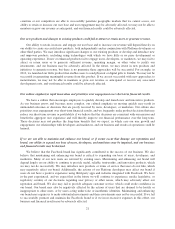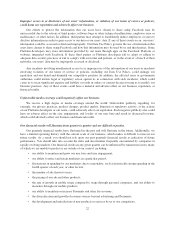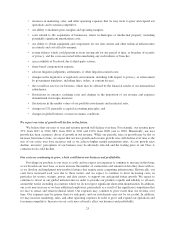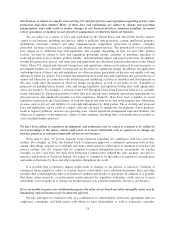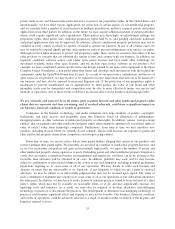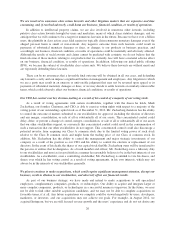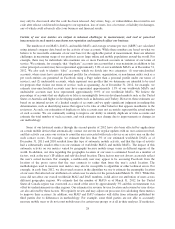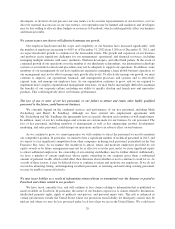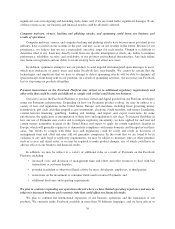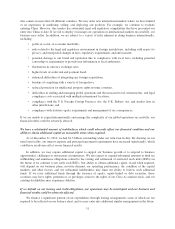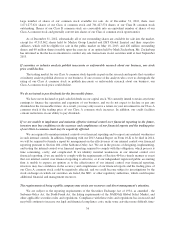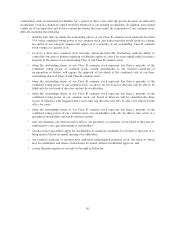Facebook 2012 Annual Report Download - page 30
Download and view the complete annual report
Please find page 30 of the 2012 Facebook annual report below. You can navigate through the pages in the report by either clicking on the pages listed below, or by using the keyword search tool below to find specific information within the annual report.We are involved in numerous class action lawsuits and other litigation matters that are expensive and time
consuming, and, if resolved adversely, could harm our business, financial condition, or results of operations.
In addition to intellectual property claims, we are also involved in numerous other lawsuits, including
putative class action lawsuits brought by users and marketers, many of which claim statutory damages, and we
anticipate that we will continue to be a target for numerous lawsuits in the future. Because we have over a billion
users, the plaintiffs in class action cases filed against us typically claim enormous monetary damages even if the
alleged per-user harm is small or non-existent. Any negative outcome from such lawsuits could result in
payments of substantial monetary damages or fines, or changes to our products or business practices, and
accordingly our business, financial condition, or results of operations could be materially and adversely affected.
Although the results of such lawsuits and claims cannot be predicted with certainty, we do not believe that the
final outcome of those matters relating to our products that we currently face will have a material adverse effect
on our business, financial condition, or results of operations. In addition, following our initial public offering
(IPO), we became the subject of stockholder class action suits. We believe these lawsuits are without merit and
are vigorously defending these lawsuits.
There can be no assurances that a favorable final outcome will be obtained in all our cases, and defending
any lawsuit is costly and can impose a significant burden on management and employees. Any litigation to which
we are a party may result in an onerous or unfavorable judgment that may not be reversed upon appeal or in
payments of substantial monetary damages or fines, or we may decide to settle lawsuits on similarly unfavorable
terms, which could adversely affect our business, financial conditions, or results of operations.
Our CEO has control over key decision making as a result of his control of a majority of our voting stock.
As a result of voting agreements with certain stockholders, together with the shares he holds, Mark
Zuckerberg, our founder, Chairman, and CEO, is able to exercise voting rights with respect to a majority of the
voting power of our outstanding capital stock as of December 31, 2012. Mr. Zuckerberg therefore has the ability
to control the outcome of matters submitted to our stockholders for approval, including the election of directors
and any merger, consolidation, or sale of all or substantially all of our assets. This concentrated control could
delay, defer, or prevent a change of control, merger, consolidation, or sale of all or substantially all of our assets
that our other stockholders support, or conversely this concentrated control could result in the consummation of
such a transaction that our other stockholders do not support. This concentrated control could also discourage a
potential investor from acquiring our Class A common stock due to the limited voting power of such stock
relative to the Class B common stock and might harm the trading price of our Class A common stock. In
addition, Mr. Zuckerberg has the ability to control the management and major strategic investments of our
company as a result of his position as our CEO and his ability to control the election or replacement of our
directors. In the event of his death, the shares of our capital stock that Mr. Zuckerberg owns will be transferred to
the persons or entities that he designates. As a board member and officer, Mr. Zuckerberg owes a fiduciary duty
to our stockholders and must act in good faith in a manner he reasonably believes to be in the best interests of our
stockholders. As a stockholder, even a controlling stockholder, Mr. Zuckerberg is entitled to vote his shares, and
shares over which he has voting control as a result of voting agreements, in his own interests, which may not
always be in the interests of our stockholders generally.
We plan to continue to make acquisitions, which could require significant management attention, disrupt our
business, result in dilution to our stockholders, and adversely affect our financial results.
As part of our business strategy, we have made and intend to make acquisitions to add specialized
employees, complementary companies, products, or technologies. Our ability to acquire and integrate larger or
more complex companies, products, or technologies in a successful manner is unproven.In the future, we may
not be able to find other suitable acquisition candidates, and we may not be able to complete acquisitions on
favorable terms, if at all. Any future acquisitions we complete could be viewed negatively by users, developers,
marketers, or investors, and our acquisitions may not achieve our goals. For example, in August 2012, we
acquired Instagram, but we are still focused on user growth and the users’ experience and do not yet derive any
26


